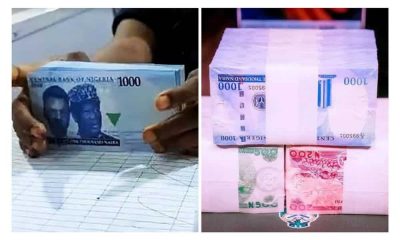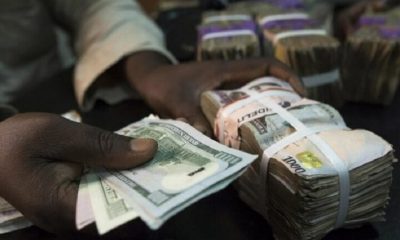Economy
Best Time to Trade Forex in Nigeria
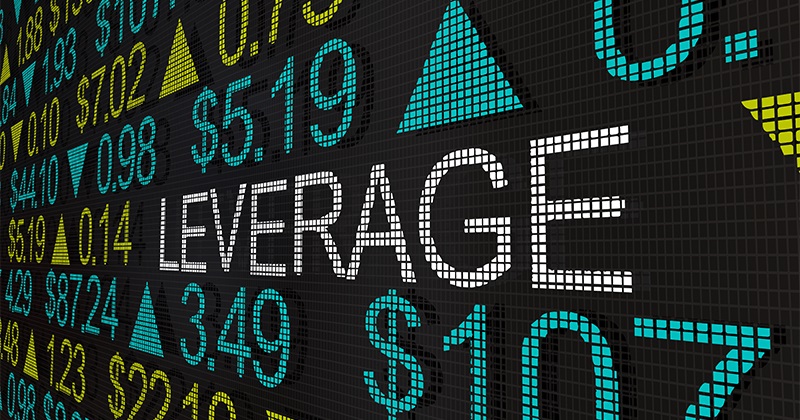
If you wonder when it’s best to trade Forex to get the best results and what the best hours to maximize your returns are, this article is for you. Read on to get the answers to these questions and find out the best trading hours.
While it can be a matter of personal preferences when to trade, and you can allocate your time depending on your daily schedule, let’s see when it’s best to enter the market to make higher profits and when it’s best to keep off trading.
Best days to trade Forex
You may have noticed that on some particular days, markets move more actively than on others. Take a look at the table below and check out the average volatility in pips for three major currency pairs (EUR/USD, GBP/USD, USD/JPY) depending on the business day:
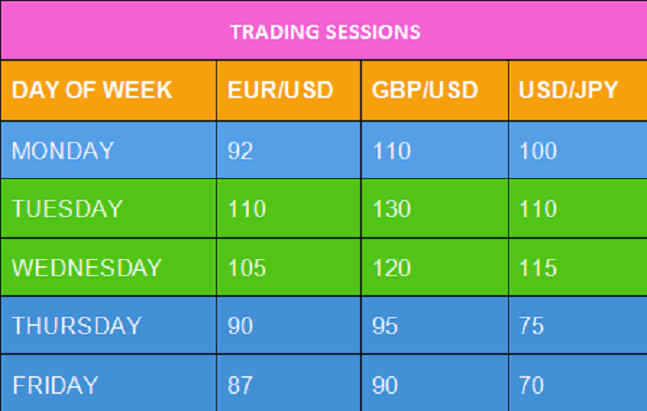
As we can see, all three pairs register the highest volatility on Tuesday and Wednesday. With that in mind, we recommend entering the market during periods of high market volatility. This way, you’ll be able to take advantage of more trading opportunities and maximize your profit even if you are using a trading bot.
Trading sessions
Now that we’ve figured out the best trading days, let’s talk about the most favourable trading time. Trading in the foreign exchange market takes place 24 hours a day five days a week. However, currency pairs can move at a different pace at different times. Although Forex is a decentralized market, a significant amount of money comes from banks, and they stick to a certain schedule.
Forex trading sessions can be divided into four major groups:
- North American (New York)
- Asian (Tokyo)
- European (London)
- Pacific (Sydney)
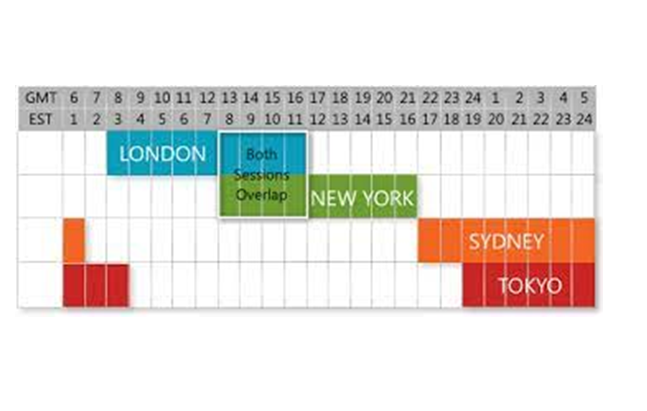
At the beginning of every session, the currencies are gaining momentum:
During the European session, all pairs containing the euro and the pound sterling demonstrate high volatility, with EUR/USD, EUR/GBP and EUR/CHF showing the largest trading volumes. Very often, the trend can commence in the European trading session and continue into the American session.
In the American session, the pairs containing the US dollar are on the rise: EUR/USD, USD/CHF and USD/JPY. During this time, the Canadian dollar, the USD/CAD pair, comes to life. During the American session, the trend may reverse. Besides, important economic reports are generally released in the evening. Those can trigger volatility spikes in currency pairs that include the US dollar.
In the Asian and Pacific session, the pairs containing the Japanese yen and NZD/USD are especially active. Throughout the night session, the market is tranquil since US and European banks are closed. The volatility is low, so the price often fails to gain momentum and break any key levels. So, the market is usually flat with the price trading within the range. For this reason, most traders prefer not to trade at night.
Best intervals for day trading
9.20 – 9.50 – The beginning of the European session. Trading volume is significant. While this trading interval offers a lot of trading opportunities, it’s highly risky as well. If you are a novice trader, we suggest that you don’t rush into the market at this point. Wait till the volatility settles a bit.
9.40 – 10.10 – Trading volumes are still significant, the quotes are moving fast, liquidity is sufficient. Now that the situation has already stabilized, it’s the perfect time to enter the market and place your orders.
10.25 – 11.10 – Volatility decreases, market participants lock in their profits and close their trades. This time interval is the best to start scheduling your next trades.
11.15 – 14.15 – Most breakouts occurring during this period are very inaccurate. Prices start moving sideways. Feel free to take a break. It’s best that you refrain from trading at this time.
14.10 – 15.25 – Most trends have already formed. There’s no sense in opening your trades now. But if you do, trade with the trend and be vigilant. Around 15:30, the trend may pause or even reverse.
15.20 -16.00 – The last 30 minutes of the day session, major market participants start adjusting their portfolios. It may seem that high volatility can bring you some good profits, we’d recommend staying on the safe side as the trading environment is too unpredictable now. Avoiding and managing risks is part of smart trading, remember?
All in all: The usual best trading time is 8 a.m. to 12 a.m. – it’s when trading hours of the New York and London exchanges overlap. These two trading hubs account for more than 50% of all Forex transactions.
When you SHOULD NOT trade
It’s funny how everyone is looking for the best time to trade. And few people think when it gets too risky to trade and when it’s better to avoid the market. It’s highly undesirable that you enter the market on:
- By the end of the week, we all get tired and tend to make illogical decisions. It can be hard to predict market behaviour at the end of the week. Friday is one of those days when the majority of traders suffer losses. Some traders lock in their profits to safely leave for the weekend. Others, on the contrary, jump into the market to make quick money. Prices start going up and down, especially in the afternoon, which can result in substantial losses.
- Banks are usually closed on holidays, market activity is low. On holidays, the risk of losing your deposit increases. You might be hoping for a spike in prices after the holidays, but the market likes to make adjustments. And they are usually not in your favour.
- News releases. We are going to offer you some obvious advice that no one takes anyway: do not trade the news. You can’t predict with 100% accuracy where the price will move after the release of significant news, a statement or a report. At this point, the price movement is often chaotic. So, we recommend exiting the market 1.5 hours before the publication. Refrain from trading for about the same amount of time after the news is released.
Summing up
While Forex is open around the clock, all traders are human beings who need their rest. That’s why it’s essential to know the trading sessions schedule and market hours that determine volatility peaks. Enter the market when it demonstrates a strong momentum. This way, you’ll be able to monitor price developments better and identify trading instruments with the highest profit potential.
Economy
Shettima Blames CBN’s FX Intervention for Naira Depreciation

By Adedapo Adesanya
Vice President Kashim Shettima has attributed the Naira’s recent depreciation to the intervention of the Central Bank of Nigeria (CBN) in the foreign exchange (FX) market, stating that the currency could have strengthened to around N1,000 per Dollar within weeks if the apex bank had allowed market forces to prevail.
The local currency has dropped over N8.37 on the Dollar in the last week, as it closed at N1,355.37/$1 on Tuesday at the Nigerian Autonomous Foreign Exchange Market (NAFEM), after it went on a spree late last month and into the early weeks of February.
However, speaking on Tuesday at the Progressive Governors’ Forum (PGF), Renewed Hope Ambassadors Strategic Summit in Abuja, the Nigerian VP said the intervention was to ensure stability.
“In fact, if not for the interventions by the Central Bank of Nigeria yesterday, the 1,000 Naira to a Dollar we are going to attain in weeks, not in months. But for the purpose of market stability, the CBN generously intervened yesterday.
“So, for some of my friends, especially one of our party leaders who takes delight in stockpiling dollars, it is a wake-up call,” the vice president said.
He was alluding to CBN buying US Dollars from the market to slow down the rapid rise of the Naira.
Latest information showed that last week, the apex bank bought about $189.80 million to reduce excess Dollar supply and control how fast the Naira was gaining value.
The move was aimed at preventing foreign portfolio investors from exiting Nigeria’s fixed-income market, as large-scale sell-offs could heighten demand for US Dollars, intensify capital flight, and exert further pressure on the exchange rate.
Amid this, speaking after the 304th meeting of the monetary policy committee (MPC) of the CBN on Tuesday, Governor of the central bank, Mr Yemi Cardoso, said Nigeria’s gross external reserves have risen to $50.45 billion, the highest level in 13 years.
This strengthens the country’s foreign exchange buffers, enhances the apex bank’s capacity to defend the Naira when needed, and boosts investor confidence in the stability of the Nigerian FX market.
Economy
Dangote Refinery Exports 20 million Litres Surplus of PMS

By Aduragbemi Omiyale
Up to 20 million litres in surplus of Premium Motor Spirit (PMS), otherwise known as petrol, is being exported daily by the Dangote Petroleum Refinery and Petrochemicals after supplying about 65 million litres to the domestic market.
Nigeria’s average daily petrol consumption stands at between 50 and 60 million litres, indicating that the refinery’s output exceeds current domestic requirements, marking a decisive break from decades of fuel import dependence and recurrent scarcity.
The president of Dangote Group, Mr Aliko Dangote, speaking in Lagos, while confirming a structured offtake agreement with selected marketers to ensure nationwide distribution and eliminate supply instability, said the structured model was designed to eliminate supply bottlenecks and curb speculative practices that have historically triggered disruptions.
“We have agreed an offtake framework to supply up to 65 million litres daily for the domestic market. Any surplus, estimated at between 15 and 20 million litres, will be exported,” he said.
Under a revised distribution framework endorsed by the Nigerian Midstream and Downstream Petroleum Regulatory Authority, the refinery will channel nationwide supply through major marketing companies, including MRS Oil Nigeria Plc, Nigerian National Petroleum Company Limited Retail (NNPC), 11 plc (Mobil Producing Nigeria), TotalEnergies Marketing Nigeria Plc, Rainoil Limited, Northwest Petroleum & Gas Company Limited, Ardova Plc, Bovas & Company Limited, AA Rano Nigeria Limited, AYM Shafa Limited, Conoil and Masters Energy.
With local refining now exceeding national demand, the country stands to conserve billions of dollars annually in foreign exchange previously spent on petrol imports. Analysts say this would ease pressure on the naira, strengthen external reserves, and improve trade balance stability.
Economy
NECA, CPPE Laud CBN’s 0.50% Interest Rate Cut

By Adedapo Adesanya
The Nigeria Employers’ Consultative Association (NECA) and the Centre for the Promotion of Private Enterprise (CPPE) have separately commended the Central Bank of Nigeria (CBN) for reducing the Monetary Policy Rate (MPR) from 27.0 per cent to 26.5 per cent at its 304th Monetary Policy Committee (MPC) meeting.
In reaction, NECA Director-General, Mr Adewale-Smatt Oyerinde, praised the decision in a statement, noting that the 50 basis-point cut is “a cautious but noteworthy signal” that authorities were responding to sustained pressures on businesses.
He said the marginal reduction might not immediately lower lending rates, but reflected “a gradual shift toward supporting growth without undermining price stability”.
According to him, the overall stance remained tight, with the Cash Reserve Ratio retained at 45 per cent and the liquidity ratio at 30 per cent.
He added that the asymmetric corridor around the MPR was also maintained, reinforcing a cautious monetary approach.
“With a substantial portion of deposits still sterilised, banks’ capacity to expand credit to the real sector may remain constrained in the near term,” he said.
Mr Oyerinde described the move as “a careful balancing act” aimed at moderating inflation without worsening pressures on businesses.
He noted that firms continued to grapple with high operating costs, exchange rate volatility and weakened consumer demand.
“Inflation, particularly in food, energy and transportation, remains a significant challenge to employers and households,” he said.
He stressed that the modest easing must be supported by coordinated fiscal and structural reforms to address supply-side constraints.
Such reforms, he said, should improve infrastructure and enhance productivity across key sectors of the economy.
Mr Oyerinde urged financial institutions to ensure the MPR reduction was gradually reflected in lending conditions for manufacturers and SMEs.
He affirmed that although the MPC had not fully relaxed its tightening stance, the rate cut signalled cautious optimism.
“Sustained improvements in inflation, exchange rate stability and investor confidence will determine scope for further easing that supports growth and employment,” he said.
On its part, the CPPE said the decision reflected improving macroeconomic fundamentals and a cautious shift from aggressive tightening.
The organisation noted that sustained disinflation, stronger external reserves, an improved trade balance and relative exchange-rate stability had created room for monetary easing.
It said the rate cut could boost investor confidence and support private-sector growth, but cautioned that weak monetary transmission might limit its impact on lending rates.
The CPPE identified high cash reserve requirements, elevated lending rates, government borrowing and structural banking costs as major constraints to effective transmission.
The group also stressed the need for fiscal consolidation, citing high public debt, persistent deficits and rising debt-service obligations as risks to macroeconomic stability.
According to the chief executive of CPPE, Mr Muda Yusuf, effective policy coordination and stronger transmission mechanisms were critical to unlocking investment and sustaining growth, lauding the CBN for what he described as a measured and data-driven policy adjustment.
The CPPE boss noted that the easing reflected strengthening macroeconomic performance, declining inflation, growing reserves, improved trade balance and enhanced foreign exchange stability.
Mr Yusuf added that for the benefits of monetary easing to be fully realised, authorities must strengthen transmission to ensure lower lending rates for the real sector and advance credible fiscal consolidation to safeguard stability.
He said that if supported by structural reforms and disciplined fiscal management, the current policy direction could unlock a stronger investment cycle and more durable economic growth.
-

 Feature/OPED6 years ago
Feature/OPED6 years agoDavos was Different this year
-
Travel/Tourism10 years ago
Lagos Seals Western Lodge Hotel In Ikorodu
-

 Showbiz3 years ago
Showbiz3 years agoEstranged Lover Releases Videos of Empress Njamah Bathing
-

 Banking8 years ago
Banking8 years agoSort Codes of GTBank Branches in Nigeria
-

 Economy3 years ago
Economy3 years agoSubsidy Removal: CNG at N130 Per Litre Cheaper Than Petrol—IPMAN
-

 Banking3 years ago
Banking3 years agoSort Codes of UBA Branches in Nigeria
-

 Banking3 years ago
Banking3 years agoFirst Bank Announces Planned Downtime
-

 Sports3 years ago
Sports3 years agoHighest Paid Nigerian Footballer – How Much Do Nigerian Footballers Earn







